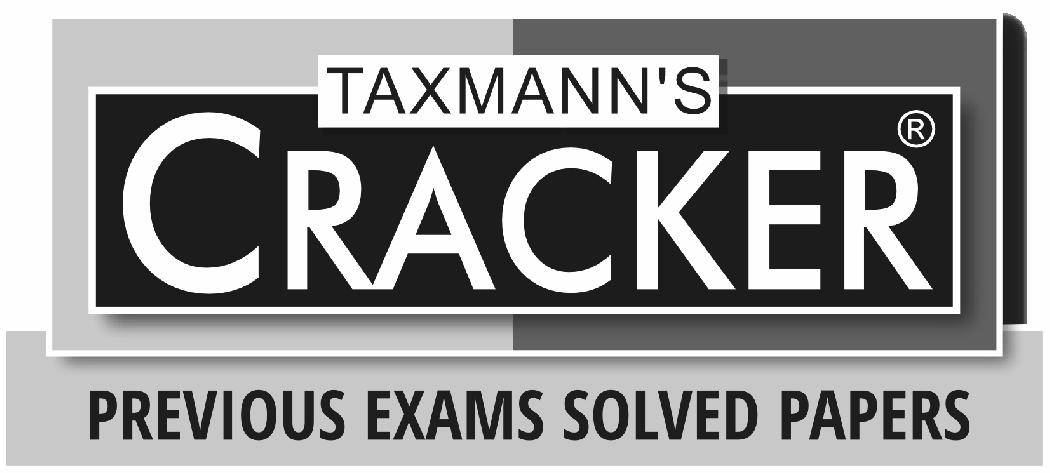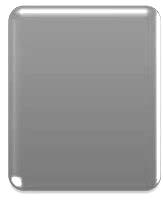© All rights reserved
Price : ` 475
Fifth Edition : June 2025
Published by :
Taxmann Publications (P.) Ltd.
Sales & Marketing :
59/32, New Rohtak Road, New Delhi-110 005 India
Phone : +91-11-45562222
Website : www.taxmann.com
E-mail : sales@taxmann.com
Regd. Office : 21/35, West Punjabi Bagh, New Delhi-110 026 India
Printed at :
Tan Prints (India) Pvt. Ltd.
44 Km. Mile Stone, National Highway, Rohtak Road Village Rohad, Distt. Jhajjar (Haryana) India
E-mail : sales@tanprints.com
Disclaimer
Every effort has been made to avoid errors or omissions in this publication. In spite of this, errors may creep in. Any mistake, error or discrepancy noted may be brought to our notice which shall be taken care of in the next edition. It is notified that neither the publisher nor the author or seller will be responsible for any damage or loss of action to any one, of any kind, in any manner, therefrom. No part of this book may be reproduced or copied in any form or by any means [graphic, electronic or mechanical, including photocopying, recording, taping, or information retrieval systems] or reproduced on any disc, tape, perforated media or other information storage device, etc., without the written permission of the publishers. Breach of this condition is liable for legal action.
For binding mistake, misprints or for missing pages, etc., the publisher’s liability is limited to replacement within seven days of purchase by similar edition. All expenses in this connection are to be borne by the purchaser. All disputes are subject to Delhi jurisdiction only.
Module 7
PROVISIONS RELATING TO AUDIT UNDER COMPANIES ACT 7.1
Module 8
AUDITING OF DIFFERENT TYPES OF UNDERTAKING
Module-wise Solved Paper: December 2024 (Suggested Answers) P.1 Paper: June 2025 P.18
CHAPTER: 7.1
STATUTORY AUDIT-AUDITOR’S ELIGIBILITY, QUALIFICATIONS, DISQUALIFICATIONS, APPOINTMENT, RESIGNATION, ROTATION, REMUNERATION, REMOVAL RIGHTS & DUTIES, LIABILITIES, BRANCH
AUDIT & JOINT AUDIT, ROLE OF AUDIT COMMITTEE
A QUICK REVIEW
In a company form of organization, the management is separated from ownership. Though shareholders are the owners of company’s properties, they do not actively take part in the management of the company; instead, the company is managed by a group of managers who are entrusted with the proper utilization of the resources procured by the company with the objective of maximization of shareholders’ wealth. Therefore, in this context, the management’s stewardship must be properly vouched by an independent 3rd party. This is why; audit of the books of account by a quali ed and independent auditor has been made mandatory in every company.
QUALIFICATIONS, DISQUALIFICATIONS, & ELIGIBILITY UNDER SECTION 141
(1)A CA can be appointed as an auditor of company
A rm can also be appointed by its rm name to act as the auditor of a company if majority of its partners practicing in India are quali ed for appointment as company auditor.
(2)Where a rm, including a limited liability partnership, is appointed as an auditor of a company, only the partners who are Chartered Accountants shall be authorized to act and sign on behalf of the rm.
(3)Where a person appointed as an auditor of a company incurs any of the disquali cations mentioned u/s 141(3), after his appointment, he shall vacate his of ce as such auditor and such vacation shall be deemed to be a casual vacancy in the of ce of the auditor.
As per section 141(3)(g), a person or a partner of a rm shall not be eligible for appointment as the auditor of a company if –
SECTION B : AUDITING
Such person is in full time employment elsewhere; or Such person or partner is, at the date of such appointment or reappointment, holding appointment as auditor of more than 20 companies, other than 1 person companies, dormant companies, small companies and private companies having paid up capital less than ` 100 crore.
APPOINTMENT OF COMPANY AUDITOR UNDER SECTION 139
ROTATION OF COMPANY AUDITOR
Eligible Companies:
The provisions for rotation of auditors shall be applicable to: Every listed company excluding one person companies and small companies;
Every unlisted public company having paid up share capital of ` 10 crore or more;
Every private limited company having paid up share capital of ` 50 crore or more;
All other companies having public borrowings from nancial institutions, banks or public deposits of ` 50 crore or more.
Maximum Term:
No individual shall be appointed or reappointed as auditor for more than one term of 5 consecutive years.
No audit rm shall be appointed or reappointed as auditor for more than 2 terms of 5 consecutive years.
Additional Conditions for Rotation:
An individual auditor or an audit rm who/which has completed his/its term shall not be eligible for re-appointment as auditor in the same company for ve years from the completion of such term.
On the date of appointment, no audit rm having a common partner or partners to the other audit rm, whose tenure has expired in a company immediately preceding the nancial year, shall be appointed as auditor of the same company for a period of 5 years.
Every company, existing on or before the commencement of this Act, which is required to comply with provisions of section 139(2), shall comply with requirements of this sub-section within a period which not be later than the date of 1st AGM of company held within speci ed period after 3 years from commencement of Companies Act.
The above provisions shall not prejudice the right of the company to remove an auditor or the right of the auditor to resign from such of ce of the company.
Rotation of Partners in the Audit Firm:
As per section 139(3), the members of a company may resolve to provide that in the audit rm appointed by it, the auditing partner and his team shall be rotated at such intervals as may be resolved by members; or the audit shall be conducted by more than one auditor.
Remuneration of Company Auditor:
Section 142 of Companies Act, 2013 contains the statutory provisions in relation to remuneration of auditors are contained in. These are as follows:
The remuneration of the auditor of a company shall be xed in its general meeting or in such manner as may be determined therein. The Board may, however, x remuneration of the rst auditor appointed by it.
The above remuneration shall be in addition to the fee payable to an auditor and shall include the expenses, if any, incurred by the auditor in connection with the audit of the company and any facility extended to him. However, it must not include any remuneration paid to him for any other service rendered by him at the request of the company.
REMOVAL OF AUDITOR
RIGHT OF AUDITOR
Inspect Books of Account and Vouchers
Obtain Information and Explanations
Inspect branch of ce & its accounts
Receive report of branch of ce from branch auditor
Sign the Audit Report and Other Documents
Receive Notices and Attend General Meetings
Have Audit Report Read at the AGM
Attend the Meeting of the Audit Committee
Right to be indemni ed
DUTIES OF AUDITOR
Duty to inquire
Duty to Report on Financial Statements of the Company
Duty Regarding Inclusion of Certain Matters in the Audit Report
Duty to Provide Reasons for any Negative Remarks/Quali cation
Duty to Comply with the Directions of CAG
Duty to comply with auditing standards
Duty to Report any Fraud to the Central Government
Duty to pay penalty
Duty to Make Comments Sought by the Audit Committee on Certain Matters
Other duties
LIABILITIES OF AUDITOR
Statutory liabilities Under Companies Act Civil liabilities
For misstatement in prospectus
Liability for misfeasance
Criminal liabilities
For misstatement in prospectus
Punishment for Non-compliance with sections 139, 144 and 145 of the Act
Punishment for Refusal or Failure to Produce Documents
Fraud in relation to company in winding up
Punishment for False Statement
Punishment for False Evidence
Under other Acts
Liabilities under Income-tax Act, 1961
Liabilities under Chartered Accountant Act, 1949
Liabilities under Life Insurance Act, 1956
Liabilities under Banking Regulation Act, 1949
Contractual liabilities
Branch audit
Joint audit
Audit Committee
PAST EXAMINATION QUESTIONS
OBJECTIVE QUESTIONS
Identify the correct alternative
Q. 1. The first Auditor of a Company shall be appointed by the Board of Directors within
(a) 30 days from the date of registration.
(b) 90 days from the date of registration.
(c) 30 days from the date of first AGM.
(d) 1 year from the date of registration. [June 2017, 1 Mark]
Ans. (a) 30 days from the date of registration.
Q. 2. In case of a company other than a Government Company, any casual vacancy in the post of auditor is to be filled by the
(a) Board of Directors
(b) Managing Director
(c) Comptroller and Auditor General (CAG)
(d) Shareholders [Dec. 2017, 1 Mark]
Ans. (a) Board of Directors
SECTION B : AUDITING
Q. 3. An Audit Committee should have a minimum of ____________ number of directors.
(a) 4
(b) 3
(c) 5
(d) 6
Ans. (b) 3
[Dec. 2017, 1 Mark; June 2024, 2 Mark]
Q. 4. Which of the following services cannot be rendered by an auditor as per Companies Act, 2013?
(a) Vouching
(
b) Verification of assets and liabilities
(
c) Issuing certificates on relevant matters
(
d) Providing investment advisory services
Ans. (d) Providing investment advisory services
[Dec. 2017, 1 Mark]
Q. 5. Statutory Auditor is appointed by the Shareholders in the
(a) General Meeting
(b) Statutory Meeting
(c) EGM
(
d) Board Meeting
Ans. (a) General Meeting
[June 2018, 1 Mark]
Q. 6. A nomination and remuneration committee should have _________ directors.
(a) 5
(b) 10
(c) 2
(d) 3
Ans. (d) 3
[June 2019, 1 Mark]
Q. 7. An individual auditor who has completed his term shall not be eligible for reappointment as auditor in the same company for
(a) Next 3 Years
(b) Next 5 Years
(c) Next 7 Years
(d) Next 8 Years
Ans. (b) Next 5 Years
[June 2019, 1 Mark]
Q. 8. Section 146 of the Companies Act, 2013 deals with (a) Auditor not to render certain services
(b) Auditor to sign Audit Reports
(
c) Auditor to attend general meeting
(d) Punishment for contravention
Ans. (c) Auditor to attend general meeting
[Dec. 2019, 1 Mark]
Q. 9. The ___________ shall act as the secretary of the Audit Committee.
(
a) Auditor
(
b) Managing Director
(
c) Comptroller and Auditor General
(
d) Company Secretary
Ans. (d) Company Secretary
[Dec. 2019, 1 Mark]
Q. 10. Remuneration of Auditors is covered under the following section of Companies Act, 2013:
(
a) Section 142
(
b) Section 148
(
c) Section 139
(
d) Section 143
Ans. (a) Section 142
[Dec. 2019, 1 Mark; Dec. 2022, 1 Mark]
Q. 11. Which of the following services by an auditor is not restricted under section 144 of the Companies Act, 2013?
(
a) Actuarial services
(
b) Rendering outsourced financial services
(
c) Investment Advisory Services
(
d) Issuing Deposit Return Certificate
Ans. (d) Issuing Deposit Return Certi cate
Q. 12. Cooling period of an individual auditor is
(a) Two consecutive terms of 5 years each
(b) One term of 4 years
(
c) Two consecutive terms of 4 years each
(d) One term of 5 years
Ans. (d) One term of 5 years
[Dec. 2021, 1 Mark]
[Dec. 2021, 1 Mark]
Q. 13. Minimum penalty payable by a company for contravention of any provisions of sections 139 to 146 (both inclusive) of Companies Act, 2013 is
(a) ` 25000
(b) ` 100000
(c) ` 30000
(d) ` 15000
Ans. (a) ` 25000
SECTION B : AUDITING
[Dec. 2021, 1 Mark]
Q. 14. The 1st auditor of Government Company is appointed by C&AG within______days.
(a) 15
(b) 30
(c) 45
(d) 60
Ans. (d) 60
[Dec. 2022, 1 Mark]
Q. 15. A cost auditor submits his report along with the reservations & observations in Form No. ___________ .
(a) CRA-1
(b) CRA-2
(c) CRA-3
(d) CRA-4
Ans. (d) CRA-4
[July 2023, 1 Mark]
Q. 16. Any casual vacancy in Government Company is filled by CAG of India within ___________ days.
(a) 15
(b) 30
(c) 45
(d) 60
Ans. (b) 30
[July 2023, 1 Mark]
Q. 17. Each qualified chartered accountant not in full time employment can be the auditor of at most companies.
(a) 10
(b) 15
(c) 20
(d) 30
Ans. (c) 20
[July 2023, 1 Mark]
Q. 18. A person who is indebted to the company for an amount of ` is not eligible for appointment as cost auditor of a company.
(a) 50000
(b) 75000
MOD. 7 : PROVISIONS RELATING TO AUDIT UNDER COMPANIES ACT 7.9
(c) 100000
(d) 500000
Ans. (d) ` 500000
[July 2023, 1 Mark]
Q. 19. In case of audit of Government body, the scope & audit programme are set by:
(
a) The Comptroller Auditor General of India (CAG)
(
b) The Companies Act, 2013
(
c) Both A & B
(d) The Board of Directors
Ans. (a) The Comptroller Auditor General of India (CAG)
[July 2023, 1 Mark]
Q. 20. Which of the following is included in permanent audit file?
(a) Extracts of important matters in the minutes of board meeting
(
b) Current year’s audit programme
(
c) Copies of management letters
(d) Analysis of significant ratios & trends
Ans. (d) Analysis of significant ratios & trends
[July 2023, 1 Mark]
Q. 21. In case there is an audit committee, the cost auditor is appointed by the:
(
a) Audit committee
(
b) Board of directors
(
c) BOD on recommendation of audit committee
(d) None of the above
Ans. (b) Board of Directors
[July 2023, 1 Mark]
Q. 22. No audit firm shall be appointed or reappointed as auditor for more than______ term(s) of _________consecutive years.
(a) One, four
(b) Two, four
(c) One, ve
(d) Two, ve
Ans. (d) Two, five
[Dec. 2023, 2 Marks]
Q. 23. Auditor’s duty to report fraud to the Central Government is guided by______ of the Companies Act, 2013.
(a) Section 139(1)
(b) Section 141(3)
(c) Section 143(12)
(d) Section 148(1)
Ans. (c) Section 143(12)
[Dec. 2023, 1 Mark]
SECTION B : AUDITING
Q. 24. Which of the following is not a duty of the Company Auditor as per section 143 of the Companies Act, 2013?
(a) Duty to make enquiry
(b) Duty to prepare financial statements
(c) Duty to give reasons for negative reporting
(d) Duty to comply with directions of CAG [June 2024, 2 Marks]
Ans. (b) Duty to prepare financial statements
Q. 25. The 1st auditor of the Government Company is appointed by _______.
(
a) Board of Directors
(b) Shareholders
(c) Audit department
(d) CAG [June 2024, 2 Marks]
Ans. (d) CAG
FILL IN THE BLANKS
Q. 1. As per SQC 1, an auditor needs to retain the working papers for a period of_____years. [Dec. 2021, 1 Mark]
Ans. 7
Q. 2. Cost audit report is submitted by the company to the Central Government within ______ days from the receipt of a copy of the cost audit report from the cost auditor. [Dec. 2021, 1 Mark]
Ans. 30
Q. 3. is a continuous critical review of financial and operating activities of a concern by appointed entity/person. [Dec. 2021, 1 Mark]
Ans. Internal audit
Q. 4. Every buyback of shares must be completed within a period____________ from the date of passing special resolution. [Dec. 2021, 1 Mark]
Ans. Fixed in General Meeting
Q. 5. Internal Auditor is appointed by the __________. [Dec. 2021, 1 Mark]
Ans. Management
Q. 6. In case of Government Audit who is the supreme Audit Institution? [Dec. 2021, 1 Mark]
Ans. Comptroller Auditor General of India
Q. 7. What are the important contents of Permanent Audit File? (Name at least three) [Dec. 2021, 1 Mark]
Ans. MOA, AOA, copies of nancial statements of previous years
Q. 8. Cost records are to be maintained as per Form___________ . [July 2023, 1 Mark]
Ans. CRA-1
Q. 9. The auditor of a banking company is to be appointed by the ________ . [July 2023, 1 Mark]
Ans. Members
DESCRIPTIVE QUESTIONS
Q. 1. In course of Audit, the Auditor found a credit item of ` 5 lakhs. On enquiry, the Auditor was informed that (1) This was very old credit balance.
(2) The creditor had not approached for payment.
(3) Besides the creditor could not be traced. Therefore, confirmation of the credit balance was not available. How this will be dealt with by the Auditor? [June 2013, 4 Marks]
Ans. Identities of creditors are not traceable to con rm the credit balance as appearing in the nancial statement of the company. It is also not a case of pending litigation. It might be a case that an income of ` 5 Lakhs had been hidden in previous year’s accounts.
The statutory auditor should obtain suf cient evidence in support of the balance. He should apply alternative audit proceeding to get documentary proof for the transactions and should not rely entirely on the management’s representations. If still does not get any lead then he should qualify his report.
Q. 2. Section 177 of Companies Act, 2013, lays down the auditor’s duty as a member of audit committee. Comment. [June 2013, 2 Marks]
Ans. The given statement is incorrect.
As per section 177(7) of Companies Act, 2013, the auditor’s & key managerial personnel shall have a right to be heard in meetings of audit committee when it considers the auditor’s report but shall not have the right to vote.
Q. 3. Statutory Auditor cannot be Internal Auditor of the company. Offer your views. [June 2013, 2 Marks]
Ans. The given statement is correct.
The statutory auditor is required to comment on the report of internal audit and performance of the internal auditor. If the statutory auditor also works as internal auditor, it will not be possible for him to give an independent and objective report u/s 143 of Companies Act, 2013.



















































